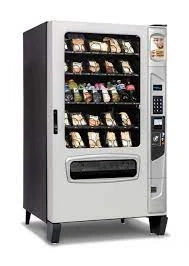In the digital age, the business landscape is constantly evolving, presenting innovative opportunities for entrepreneurs to explore. One such intriguing venture is the online vending machine business. This novel approach to vending has piqued the interest of many aspiring business owners seeking a foothold in the e-commerce world. But just how profitable is the online vending machine business? In this comprehensive exploration, we'll delve into the dynamics, challenges, and potential profitability of this emerging business model.
The Evolution of Vending Machines: From Brick-and-Mortar to Cyberspace
Traditionally, vending machines have adorned physical spaces, dispensing snacks, beverages, and various products with a satisfying clink. However, the online vending machine business represents a digital evolution, seamlessly integrating technology and e-commerce into the vending experience. Instead of physically inserting coins, consumers browse digital menus, make selections, and complete transactions online.
The allure of this business model lies in its accessibility. Online vending machines break down geographical barriers, enabling businesses to reach a global audience without the limitations of physical storefronts. As the world becomes increasingly connected, the potential for expansion and revenue growth becomes virtually limitless.
The Prospects of Profitability
The profitability of any business venture hinges on multiple factors, and the online vending machine business is no exception. Let's explore some key aspects that contribute to its potential profitability:
1. Low Overheads and Reduced Costs
Compared to traditional retail, online vending machine businesses benefit from significantly lower overheads. The absence of physical stores, rental costs, and utility bills translates to substantial savings. Additionally, operational expenses related to inventory management and maintenance can be minimized through efficient digital processes.
2. Wide Reach and Accessibility
One of the key advantages of online vending machines is that they may reach a vast and diverse customer base. The number of people choosing to shop online is expanding the potential market for these virtual devices. By tapping into different demographic segments and markets, online vending businesses can achieve a higher volume of sales and revenue.
3. Convenience and 24/7 Availability
Online vending machines are always open for business. This 24/7 availability aligns with the modern consumer's desire for convenience and flexibility. Whether it's late-night cravings or last-minute gift purchases, online vending machines cater to customers' needs whenever they arise.
4. Personalization and Data Insights
Personalization is a driving force in modern commerce, and online vending machines have the capability to tailor offerings to individual preferences. By analyzing user data and purchase history, businesses can curate product recommendations that resonate with customers, enhancing the likelihood of repeat purchases and brand loyalty.
5. Potential for Automation
Automation is at the core of online vending machine operations. Streamlined processes, from order placement to payment processing, can be automated, reducing the need for extensive manual intervention. This not only improves operational efficiency but also frees up resources for strategic growth initiatives.
Challenges and Considerations
While the online vending machine business presents promising prospects, it's essential to acknowledge the challenges that come with this venture:
1. Competition in the Digital Space
The online marketplace is highly competitive, with numerous businesses vying for the attention of digital consumers. To stand out, online vending machine businesses must offer unique products, exceptional customer service, and an intuitive user experience.
2. Technology and Security
The success of online vending machines relies heavily on robust technology infrastructure and secure payment gateways.
3. Shipping and Fulfillment
Unlike physical vending machines, online vending machines require a reliable shipping and fulfillment process. Timely delivery, accurate tracking, and effective inventory management are crucial aspects that can impact customer satisfaction and overall profitability.
4. Marketing and Branding
Effectively marketing an online vending machine business is essential for attracting customers. Developing a strong online presence, optimizing for search engines, and engaging in strategic digital marketing efforts are integral to building brand recognition and driving traffic.
5. Customer Experience
Providing an exceptional customer experience is vital for retaining customers and encouraging repeat business. Prompt customer support, hassle-free returns, and personalized recommendations all contribute to a positive shopping journey that encourages loyalty.
Conclusion:
The online vending machine business holds significant profit potential for entrepreneurs who navigate the digital landscape strategically. Due to its ability to get over geographical limitations, save money, and meet the convenience demands of modern consumers, it is a promising e-commerce attempt.
But in order to succeed in this industry, one must possess a thorough understanding of the market, a devotion to technological perfection, and an unrelenting dedication to client satisfaction.
Online vending machine firms can carve out a lucrative niche in the huge world of e-commerce by tackling difficulties, utilising data insights, and adjusting to changing consumer demands.
Success in any commercial venture depends on meticulous planning, tenacity, and readiness to modify strategies in response to shifting market circumstances. A successful online vending machine firm may not only generate money but also transform how consumers interact with products in the marketplace.



